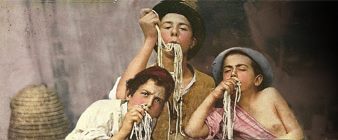

 |
 |

Molecular Gastronomy SeminarHome >> Experiences
Click for 360° panorama of the cooking demonstration (details below). Who is This? Hervé This is a French chemist and author who published books which me and my family have been reading for the last 15 years. Mr This investigates all sort of chemical phenomena and illustrates them with brilliant and very fun experiences you can do in your own kitchen. He was also the spiritual father of Molecular Cuisine, like Ferran Adria or Pierre Gagnaire do. Mr This would discuss the cooking of eggs at various temperatures, then suddendly float the idea - 'We could cook the egg yolk so much that it could be shaped in little sticks that could then be dipped in a bread cream we would inject inside the egg. We would reverse the bread-in-egg tradition. That would be fun!'. I had been looking for quite a while to attend one of these seminars and was lucky to get in for a full day special conference on March 20th to celebrate the 20th anniversary of the birth of French Molecular Gastronomy. The venue was an auditorium at Ecole Grégoire Ferrandi, a large craftsman school in downtown Paris with a famous culinary section. The school has been hosting This' conferences for 10 years as a courtesy to him. For 30 euros I could get a seat - lunch included. Many people had been turned down since there were only 100 seats. As I arrived the room was already as full as a 300-minute-egg, mostly with regulars who all knew each other. This made a point of asking each and every last participant to introduce himself and proposed we all used the familiar 'tu' form, not a common thing in France. Who was there? All foodies, no doubt, but what sort? Chemistry professors, a moustached retired schoolteacher who gave me tips on alginate fun in the kitchen, bloggers, cookery instructors, diet coaches, a few pastry chefs, the people from chefmaster.com, scienceetgastronomie.com, artetcuisine.fr, qualibre.com, Honey and Salt, an American wine journalist, two comedians, one historian and a few cookbooks authors such as Nicole Renaud, French food historians Alain Drouard and Danièle Alexandre-Bidon. Everyone introduced themselves in turn, being forced by Mr This to repeat louder if inaudible. Who was the last person in the auditorium to be asked to introduce himself? You bet. Here I went: 'I am FX, amateur Swiss gourmet, author of FXcuisine.com, a website with 150,000 visitors last month which I invite you to visit.' Molecular Gastronomy celebrates its 20th anniversary, Mr This started the day with a discussion of the many scientists who, before him, investigated chemical and physical phenomena in the kitchen. American readers will readily point out that Harold McGee wrote a very serious book about science in the kitchen before Mr This published anything, but Mr This retorts that 'Before Harold there were many people, such as this ancient Egyptian who wrote this here scroll about fermentation.'. So he wasn't the first to scientifically investigate culinary processes, but it is This' contention that he was the first to define a new science, called 'Molecular Gastronomy'. Whether you agree or not will be relevant mostly to the history of science a century from now, but This is certainly the most brilliant and energetic proponent of science in the kitchen. He started out in 1980 as a young chemist, and was soon offered a place at the prestigious (for France) Collège de France laboratory. When he became Dr This, there were two Nobel Prize winners on his doctorate jury. Mr. This briefly retraced his steps over 20 years of 'molecular gastronomy', showing us how he analyzes old recipes to try and see whether the old chefs' intutions could be scientifically tested to show if they made sense or not. The idea is that chefs often make very precise observations of chemical reactions in the kitchen but sometimes offer rather unscientific explanations for why exactly things work like this. Mr This' love of putting old chefs' sayings through scientific testing is very typical of the French mind, enamored of rationality and abstract reasoning but proudly attached to its century-old traditions at the same time. You've got to love this guy. This is such a well-mannered, pleasant, outgoing, food-loving person that one is surprised that the only lady he is not a friend of is Dorothy. As he was reviewing the biographies of scientists, natural philosophers and chemists of centuries past, the central point of each life seemed to be whether their wives cheated on them, if possible with another scientist, and just how many bastard children they had sired. Very fun, but even for a French audience, a definite focus on 'la bagatelle'. Next on the chair was French historian Danièle Alexandre-Bidon, (click for 300° panorama), who spoke about measures of times and quantity in medieval cookbooks. Before clocks entered the kitchen it was impossible for cooks to precisely tell another cook exactly how long something should cook. Some authors said "Cook as long as it takes to recite a Pater Noter" but most used expressions like "Boil for a good little while". Hildegard von Bingen indicates that, timewise, a miserere takes as long as 3 pater nosters. Volume was indicated as 'a much as a hazelnut shell will contain' or 'a walnut shell' or 'an eggshell'. Mrs Bidon drew up a list of every expression used to express cooking time in Medieval cookbooks. For instance in the 'Ménagier de Paris', where bread was toasted to make sauces, the degree of cooking for bread is referred to as 'Sauri, seulement roussi, hâlé, noirci, brûlé, brûlé tant qu'il soit noir' (toasted, browned, swarthied, blackened, burnt, burnt so much that it is black). But she assumes that each expression corresponds to one specific cooking time and only one. So when an author write "cook for a little while" in one recipe, then "cook for some time", Mrs Bidon assumed there was a hidden scale that made each of these two expressions mean one specific time and that both were different. This is rather doubtful but her paper was fun to listen to nonetheless. Next was a more scientific paper: Rachel Edward-Stuart from Nottingham University studied how oil penetrates potatoes in potato salad at Hervé This' Collège de France lab. A mundane subject in appearance, this study helped understand how to minimize French fries' fat content. In a short and good-humored presentation with schematics to explain her set-up, the young chemist walked us through the various stages of her experience until finally she explained that hot potatoes absborb oil more readily through capillary action in the space freed up by cells broken by the cooking. Furthermore, oil is not absorbed evenly by all parts of the potato - the sides soak up much less oil than the core, as a simple experiment demonstrated. The day's experiment was to add oil to boiled potatoes when cold and while still hot, and to compare the samples. We were each given two samples of her potato salad two plastic cups each with a three digit number. We confirmed her findings - when you add the oil while potatoes are still hot, they soak up more oil and are more tasty. Clearly a proper experiment would have forbidden us to eat or drink or smoke anything before any tasting, and would have used three samples with two similar and one different. But this would have meant too many potatoes for a 100 person seminar. I pointed out that I normally add a full vinaigrette to my potatoes while preparing potato salad, but apparently this would not change the result. Rachel Edward-Stuart looked at us worryingly as we voted for our favorite sample. We confirmed her findings. Food Poetry Interlude Are you a 'super taster'? ... Article continues NEXT PAGE... |
|
Bookmark with: